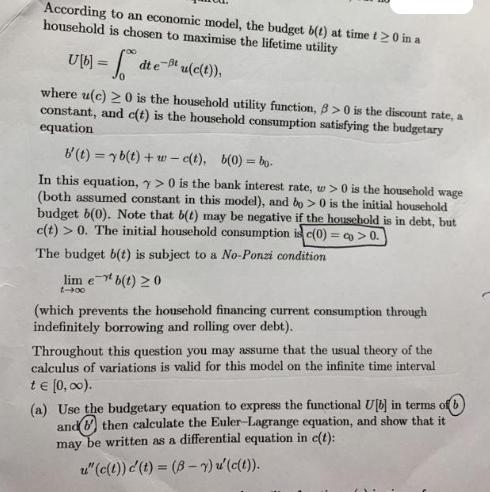Answered step by step
Verified Expert Solution
Question
1 Approved Answer
According to an economic model, the budget b(t) at time t0 in a household is chosen to maximise the lifetime utility Ub]= 00 =====

According to an economic model, the budget b(t) at time t0 in a household is chosen to maximise the lifetime utility Ub]= 00 ===== dt et u(c(t)), 0 where u(c) 20 is the household utility function, > 0 is the discount rate, a constant, and c(t) is the household consumption satisfying the budgetary equation (t)=yb(t)+w- c(t), b(0)=bo. In this equation, y > 0 is the bank interest rate, w> 0 is the household wage (both assumed constant in this model), and bo> 0 is the initial household budget b(0). Note that b(t) may be negative if the household is in debt, but c(t)>0. The initial household consumption is c(0)=>0. The budget b(t) is subject to a No-Ponzi condition lim e b(t) 0 t-00 (which prevents the household financing current consumption through indefinitely borrowing and rolling over debt). Throughout this question you may assume that the usual theory of the calculus of variations is valid for this model on the infinite time interval t [0, ). (a) Use the budgetary equation to express the functional U[b] in terms of b then calculate the Euler-Lagrange equation, and show that it may be written as a differential equation in c(t): and u" (c(t)) '(t)=(8-y) u'(c(t)).
Step by Step Solution
There are 3 Steps involved in it
Step: 1

Get Instant Access to Expert-Tailored Solutions
See step-by-step solutions with expert insights and AI powered tools for academic success
Step: 2

Step: 3

Ace Your Homework with AI
Get the answers you need in no time with our AI-driven, step-by-step assistance
Get Started


